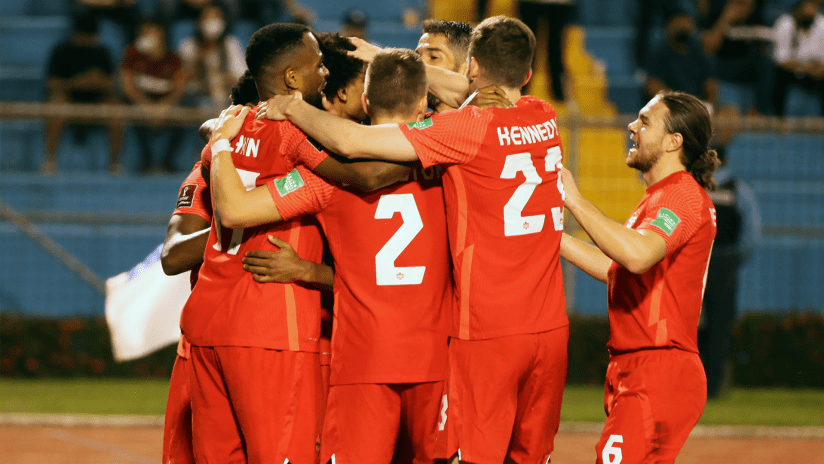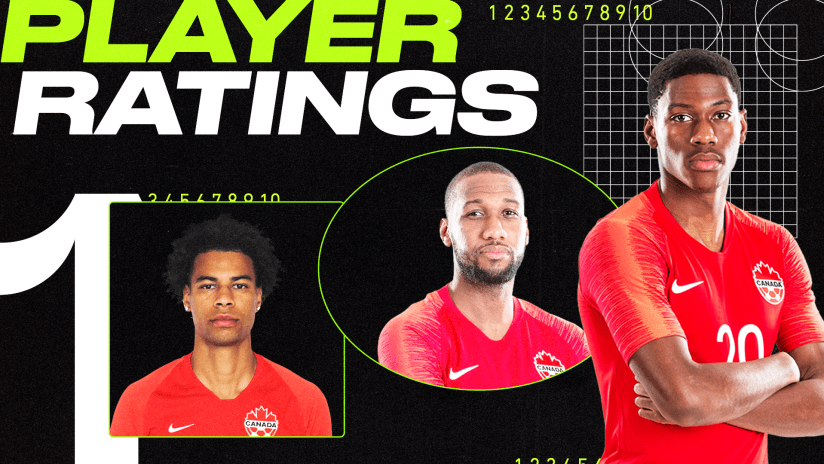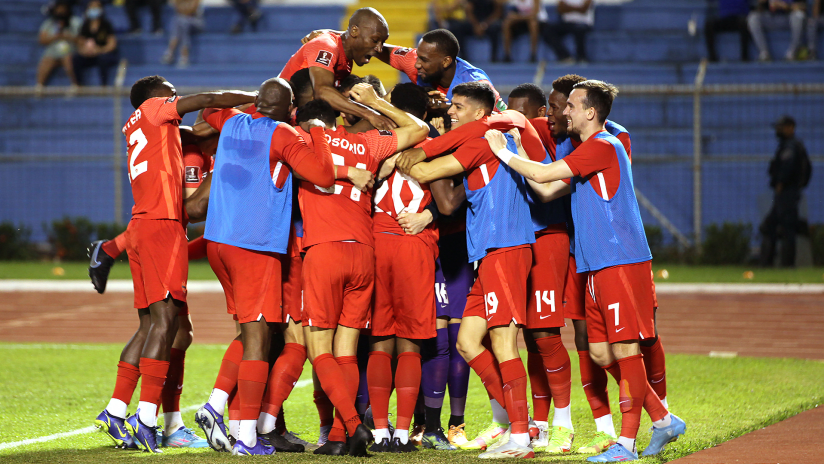The Canadian men’s national team wouldn’t be in this position during Concacaf World Cup Qualification if they didn’t overcome mental hurdles.
From righting the wrongs of the 2019 Gold Cup quarterfinal against Haiti to hanging with Concacaf’s elite, and in some cases beating them, Canada have rightfully earned their place atop the Octagonal table heading into visits to Honduras (Jan. 27) and El Salvador (Feb. 2) that sandwich a home test vs. the United States (Jan. 30).
It’s the penultimate three-game window for head coach John Herdman’s team as they seek one of the region’s three automatic Qatar 2022 spots. But Central America has traditionally been a graveyard for Canadian soccer’s optimism, and they’re yet to be tested during this final round in that part of the region.
Visit to Honduras
That ends on Thursday night when Les Rouges visit San Pedro Sula (8:05 pm ET | OneSoccer, Paramount+). It’s a fitting destination, as there may not be a more notorious game in the history of Canada’s men’s program than an 8-1 defeat at the Hondurans in 2012.
No Canadian team has won in Honduras since 1985, a run of seven straight games. Even a draw has proven difficult to earn. It’s been 29 years since Canada did so as the away team in this fixture.
But that’s in the past. This is 2022, with a headstrong group of players leading the charge, carrying an undefeated record (4W-0L-4D) and table-topping 16 points into the six final WCQ matchdays.
“Everybody's committed to the cause,” said Junior Hoilett, among the Canadian players who last played in Honduras in 2016. “We started off camp in high spirits. … When we face adversity, we stick together, and that pushes us to get the best out of each other.”
The last match between these two teams in San Pedro Sula ended 2-1 in favor of the hosts nearly six years ago. Canada struck first on that fateful afternoon but couldn’t nick that decisive second goal and it cost them dearly.
It has happened to the best of teams in Concacaf. The atmosphere is fervent, the early-morning noise outside the hotel is just as raucous as it is inside the Estadio Olímpico Metropolitano.
"It was a hostile environment,” Hoilett recalled of his previous Honduran experience. “I think we started the game well, but we didn't kill the game, which we had chances to do."
How to replace Davies?
There are more game-changers in this Canadian side than there were in the previous qualifying cycle. However, they'll be missing the biggest impact player in Alphonso Davies. The 21-year-old Vancouver Whitecaps FC product is suffering from a mild case of myocarditis and has been ruled out indefinitely as a result.
The potential replacements are plentiful, from Hoilett to Liam Millar. Cyle Larin could potentially fill in on the left wing in a similar inside forward role that he occupies with Turkish Süper Lig side Besiktas.
This isn’t anything Canada aren’t used to, though. They qualified for a first Gold Cup semifinal in 14 years without the Bayern Munich star and nearly forced extra time against Mexico in the semifinal. There were four or five key starters missing on that night, yet it took 98 nerve-wracking minutes for El Tri to clinch the victory.
In October, Canada was missing Larin – the team’s top scorer in 2021 – Hoilett, Atiba Hutchinson and Lucas Cavallini. Plus, they dealt with suspensions to other key players like Tajon Buchanan during that three-match window.
“This is what we are built for,” Herdman said. “We built those experiences, traveling to Miami or Florida in March to play those matches in the height of COVID. … Going to places like Haiti and then coming out of that heading into a Gold Cup with a roster that, in many people’s eyes, was very depleted.
“Those experiences have just created a foundation where we get into these windows with confidence that everyone is committed.”
Losing a player of Davies’ magnitude is a challenge, of course, but the squad is taking a glass-half-full approach to the news.
“Off the field, he brings good vibes to the camp and it’s nice to know to have a guy that plays at such a high level is calm and comfortable and able to crack jokes with us,” said defender Kamal Miller after a CF Montréal training session on Jan. 18. “When [other teams] don’t see his name on the roster, they might think ‘oh, today is our day, they don’t have Alphonso.’ But again, Canada has a squad with so much depth. We have so many guys that could fill in there, I don’t think teams are really going to be able to predict how we’re going to play against them.”
Filling Eustaquio's shoes
Another wrinkle is the loss of central midfielder Stephen Eustaquio to COVID-19 right before his loan move to Portuguese powerhouse side Porto was completed. There is still optimism that he can play a role over the next week, but it’s a fluid situation.
“For medical reasons, he will be day by day,” Herdman said of Eustaquio’s status. “So we are just waiting to see if he’ll be clear to come in. We are hopeful we could see him at any time.”
Eustaquio’s absence could mean extra reliance on Atiba Hutchinson to begin this window. The soon-to-be 39-year-old was arguably the man of the match in November’s 2-1 win over Mexico, making the team’s all-time appearances leader a borderline like-for-like replacement for Canada’s midfield maestro.
The January window was always going to be the ultimate challenge for this group. Some unforeseen curveballs have been thrown their way over the last few weeks, but a victory over Honduras could kickstart the final leg of the journey towards Qatar – a World Cup stage they haven’t reached since 1986.













